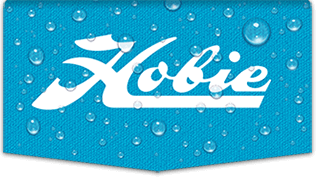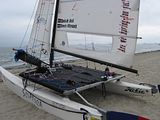I would go with srm's idea of a third wheel on the tongue, preferably an extendable wheel. The less excess you have to deal with the better, unless you have a specific need. The boat is really easy to move.
As far as sailing solo goes, it depends on what you're use to. I learned to sail in the ocean with both sails. Yes, I use to pray for light winds but now, I won't even go out unless it's 8 to 10 mph. I use to capsize (and right the boat, of course) so much that the lifeguards stopped calling for "vessel assistance" to assist me.

I now train the beach lifeguards annually on "catamaran capsize and rescue." The idea is to be prepared for the unexpected, or in the case of sailing, the expected. If you sail long enough, you WILL capsize, you WILL get caught in windless conditions, you WILL have mishaps on the water. Make sure you have an adequate solo righting system, a VHF radio and a GPS which will enable you to give your co-ordinance to the powers that be should you run into trouble. Also, make sure they (the radio & GPS) are on your persons. They won't do you any good if they're on your boat and you get separated from it. I use a fanny-pack. Necessary tools and spare parts are always good to have. I don't mean extra rudders or anything. I'm talking shackles and pins, a good pair of cable cutters, e.t.c. It's always good to have a sound boat (good standing rigging, e.t.c.). This will minimize most repairs required while sailing. Check your boat twice before taking it out. Any adjustments will be a lot easier to make on land than they will to make on water. Know that everything is going to take time to get use to. I've created a lot of extras on my boat. Some are over-kill, I know, but they make it easier for me to sail my boat solo. It's O.K. for sailing to be work but it mustn't be a job. Oh, and don't forget the PFD.

Hey, I've done it myself and capsized the boat attempting a jibe to turn around and go back and get it. Fifty yards from land...embarrassing.








